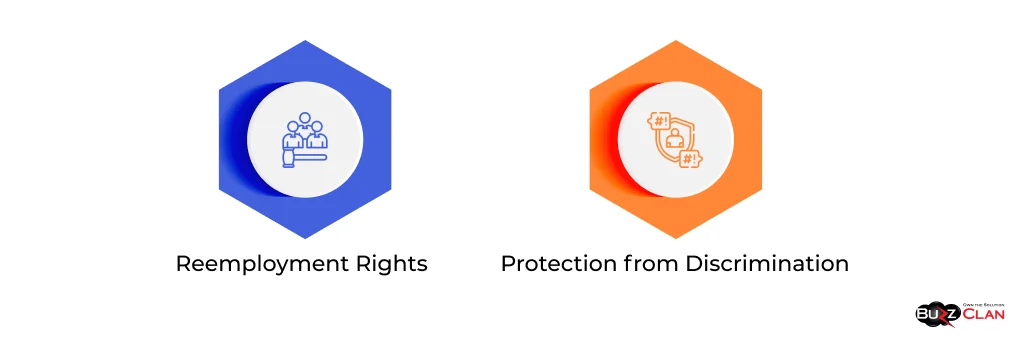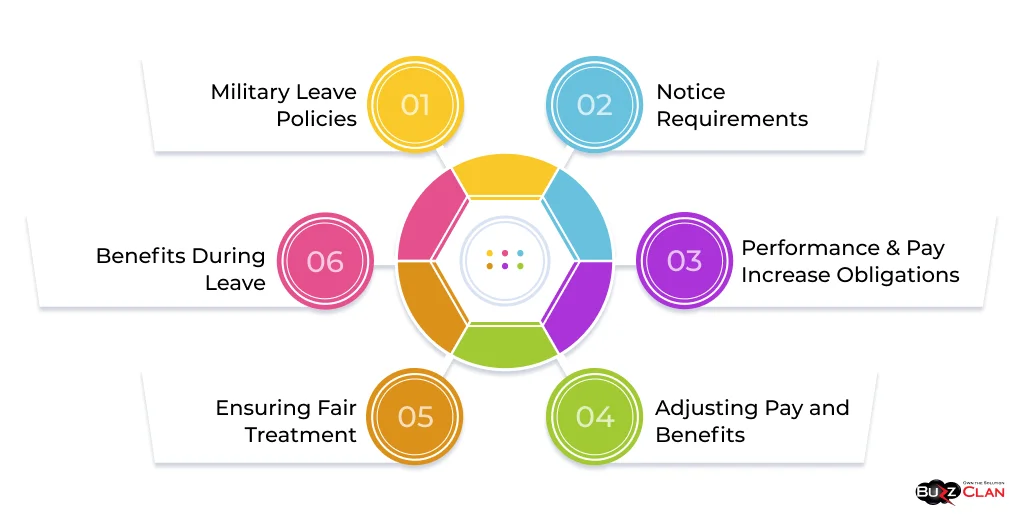Navigating USERRA Compliance: Employer Duties, Best Practices, and Case Studies
Pallavi Gandhi
Jun 19, 2024
Introduction
The Uniformed Services Employment and Reemployment Rights Act (USERRA) is a crucial piece of legislation that protects the employment rights of individuals who serve in the United States military. As an employer, understanding and complying with USERRA is a legal obligation and a way to support and honor the brave men and women who dedicate their lives to serving our country. By ensuring that military service members can return to their civilian jobs without fear of discrimination or loss of benefits, employers play a vital role in maintaining the strength and readiness of our armed forces.
This comprehensive blog post will provide a detailed overview of USERRA and the specific obligations that employers must meet to ensure compliance. We will discuss the key aspects of USERRA, including reemployment rights, protection from discrimination, military leave policies, and performance and pay increase obligations. Additionally, we will explore best practices for USERRA compliance, address common scenarios and frequently asked questions, and highlight real-world case studies that demonstrate successful implementation.
Whether you are a small business owner, an HR professional, or a manager in a large corporation, this guide will equip you with the knowledge and tools necessary to navigate the complexities of USERRA and create a supportive environment for your employees who serve in the military. By the end of this post, you will have a solid understanding of your obligations under USERRA and be well-prepared to foster a compliant and military-friendly workplace.
Overview of USERRA
The Uniformed Services Employment and Reemployment Rights Act (USERRA) is a federal law enacted in 1994 to protect the employment rights of individuals who voluntarily or involuntarily leave their civilian jobs to perform military service. USERRA applies to all public and private employers in the United States, regardless of size, and covers a wide range of military service, including active duty, reserve duty, and National Guard duty.
The primary purpose of USERRA is to ensure that service members can return to their civilian jobs with the same pay, benefits, and status they would have attained had they not been absent due to military service. The law also prohibits employers from discriminating against employees or applicants based on their military service or obligation.
USERRA has its roots in the Veterans’ Reemployment Rights (VRR) law, enacted in 1940 to protect service members’ civilian employment during World War II. Over the years, the law has been amended and expanded to provide greater protections for service members and to address the changing needs of the military and the workforce.
The enactment of USERRA in 1994 was a significant milestone in the history of veterans’ employment rights. The law strengthened and clarified the protections afforded to service members and provided a comprehensive framework for employers to follow in supporting their employees who serve in the military.
Key Employer Obligations Under USERRA
USERRA imposes several key employer obligations to protect service members’ employment rights. These obligations apply to all employers, regardless of size or industry.

Reemployment Rights:
One of the most significant obligations under USERRA is the requirement to reemploy service members upon their return from military duty. Employers must promptly reinstate returning service members to their former positions or positions of seniority, status, and pay. This obligation applies to service members absent for up to five years due to military service.
In addition to reinstatement, employers must also provide returning service members with any promotions, pay increases, or other benefits they would have received had they not been absent due to military service. Employers may require returning members to document their military service and honorable discharge.
Protection from Discrimination:
USERRA prohibits employers from discriminating against employees or applicants based on their military service or obligation. This protection extends to hiring, promotion, retention, and other terms and conditions of employment. Employers cannot deny service members employment, reemployment, or benefits based on their military status or obligation.
Employers cannot retaliate against employees who exercise their rights under USERRA, file a complaint, or participate in an investigation or proceeding related to USERRA. Retaliation can take many forms, including demotion, harassment, or termination.
Employer Obligations for Military Leave
USERRA requires employers to provide certain protections and benefits to employees who take military leave. These obligations ensure that service members can perform their military duties without fear of losing their civilian jobs or benefits.

Military Leave Policies:
Employers must have written policies in place that clearly explain the rights and responsibilities of employees who take military leave. These policies should cover topics such as eligibility for leave, notice requirements, benefits continuation, and reemployment rights.
Employers must also give employees written notice of their rights and obligations under USERRA. This notice can be included in the employee handbook or as a separate document.
Notice Requirements:
Employees who take military leave must give their employers advance notice unless military necessity prevents them from doing so. The notice can be oral or written and should include the anticipated duration of the leave.
Employers may request documentation, such as orders or training schedules, to support the need for military leave. However, employers cannot require documentation that is not readily available or would impose an undue burden on the employee.
Benefits During Leave:
Employers must continue certain benefits for employees on military leave as if they were continuously employed. These benefits include health insurance, pension plans, and other fringe benefits.
For health insurance, employers must continue coverage for up to 24 months, with the employee paying the same premium as if they were actively working. Under the Consolidated Omnibus Budget Reconciliation Act (COBRA), employees on military leave also have the right to elect to continue their health coverage for up to 18 months.
Employers must also continue to accrue vacation and sick leave for employees on military leave as if they were continuously employed. Upon return from leave, employees must be reinstated with the same benefits they had before their military service.
Performance and Pay Increase Obligations:
USERRA requires employers to ensure that employees who take military leave are not penalized in their performance evaluations or pay increases due to their absence.
Ensuring Fair Treatment:
Employers must treat employees on military leave the same as other employees on comparable forms of leave, such as jury duty or family medical leave. This means that employees on military leave cannot be subjected to adverse performance evaluations or denied pay increases solely because of their absence.
Employers must also ensure that employees on military leave receive the same opportunities for advancement and training as other employees. If an employee on military leave misses a training opportunity or a chance to compete for a promotion, the employer must provide a comparable opportunity upon the employee’s return.
Adjusting Pay and Benefits:
Upon return from military leave, employees are entitled to any pay increases or seniority-based benefits they would have received had they not been absent. This includes across-the-board pay increases, cost-of-living adjustments, and merit-based raises.
Employers must also make reasonable efforts to qualify returning service members for any new skills or certifications required for their positions. This may involve providing training or allowing time for the employee to obtain the necessary qualifications.
Specific Scenarios
Employers often face unique situations and have specific questions about their obligations under USERRA. Let’s address some common scenarios and frequently asked questions.
Common Scenarios:
- An employee is called to active duty for an unknown duration. What are the employer’s obligations?
- The employer must grant the leave and provide the required benefits and protections under USERRA. The employee should provide as much notice as possible and keep the employer informed of any changes in their service duration.
- An employee returns from military leave and requests reemployment in a different position. Is the employer obligated to grant this request?
- The employer must make reasonable efforts to qualify the employee for the requested position. However, if the employee is not qualified for the new position, the employer may reinstate them to their former position or a position of seniority, status, and pay.
Best Practices for USERRA Compliance
To ensure compliance with USERRA and create a supportive environment for employees who serve in the military, employers should follow these best practices:
- Training and Education:
Comprehensive training on USERRA for managers, supervisors, and HR professionals ensures compliance and fosters a military-friendly workplace. Training should cover topics such as:
| S. No. | Training and Education |
|---|---|
| 1 | Understanding the key provisions of USERRA and employer obligations |
| 2 | Recognizing and preventing discrimination based on military status |
| 3 | Handling military leave requests and reemployment processes |
| 4 | Maintaining benefits and seniority for employees on military leave |
| 5 | Communicating effectively with employees about their USERRA rights |
Training should be conducted regularly and updated to reflect changes in the law or best practices. Employers should also ensure that new hires receive USERRA training in their onboarding process.
- Documentation and Record-Keeping:
Maintaining accurate and comprehensive records is crucial for demonstrating compliance with USERRA. Employers should document all aspects of military leave, including:
| S. No. | Documentation and Record-Keeping |
|---|---|
| 1 | Leave requests and approval processes |
| 2 | Dates of military service and expected return |
| 3 | Benefits continuation and any changes in coverage |
| 4 | Reemployment processes and any accommodations provided |
| 5 | Performance evaluations and pay increases for employees on military leave |
Employers should also maintain records of USERRA training, policies, and any complaints or incidents related to military leave or re-employment. These records should be kept separate from general personnel files and maintained in a secure location with limited access.
- Communication Strategies:
Effective communication between employers and employees ensures a smooth transition to and from military leave. Employers should:
| S. No. | Communication Strategies: |
|---|---|
| 1 | Provide clear and accessible information about USERRA rights and obligations, including written policies and notices |
| 2 | Encourage open dialogue and support for employees who take military leave |
| 3 | Designate a specific point of contact for military leave and reemployment questions |
| 4 | Regularly check in with employees on military leave to provide updates and maintain a connection to the workplace |
| 5 | Celebrate and recognize the contributions of employees who serve in the military |
- Legal and Ethical Considerations:
Complying with USERRA is a legal requirement and an ethical obligation to support those who serve our country. Employers should:
| S. No. | Legal and Ethical Considerations |
|---|---|
| 1 | Approach USERRA compliance with a spirit of goodwill and a commitment to doing what is suitable for service members |
| 2 | Go beyond the minimum legal requirements to create a truly supportive and inclusive workplace for military employees |
| 3 | Foster a culture that values and respects military service and the sacrifices made by service members and their families |
| 4 | Seek legal counsel when necessary to ensure compliance with USERRA and other relevant laws |
Case Studies and Examples
Let’s explore two real-world case studies to illustrate the importance of USERRA compliance and the impact of supportive employer practices.
Case Study 1: Acme Corporation’s Military Leave Policy
Acme Corporation, a large manufacturing company, recognized the need to support its employees who serve in the National Guard and Reserve. To ensure compliance with USERRA and create a military-friendly workplace, Acme implemented a comprehensive military leave policy that included:
- Detailed procedures for requesting and approving military leave
- Continuation of health benefits and other fringe benefits during military service
- Reemployment processes that ensured prompt reinstatement to the same or a comparable position
- Training for managers and supervisors on USERRA obligations and support for military employees
- Regular communication and care packages for employees on military leave
As a result of these efforts, Acme experienced increased employee morale, retention, and productivity among its military employees. The company also received recognition from local and state officials for its commitment to supporting the military community.
Case Study 2: Smith & Sons’ Reemployment Challenge
Smith & Sons, a small family-owned business, faced a challenge when one of its key employees was called to active duty for an extended period. Despite the difficulties of covering the employee’s responsibilities during their absence, Smith & Sons was committed to complying with USERRA and supporting their employee.
When the employee returned from military service, Smith & Sons:
- Promptly reinstated the employee to their former position with the same pay and benefits
- Provided training to help the employee refresh their skills and catch up on any missed developments
- Offered flexible scheduling to accommodate the employee’s ongoing military commitments
- Publicly recognized the employee’s military service and expressed gratitude for their sacrifices
Through these actions, Smith & Sons met its legal obligations under USERRA and demonstrated its genuine support for military employees. The company’s efforts helped to ease the employee’s transition back to civilian work and strengthened the overall workplace culture.
Lessons Learned:
These case studies highlight several key lessons for successful USERRA compliance and support for military employees:
- Developing comprehensive policies and procedures for military leave and reemployment is essential for ensuring compliance and consistency
- Training managers and supervisors on USERRA obligations and best practices is critical for fostering a military-friendly workplace culture
- Maintaining open communication and support for employees on military leave helps to ease transitions and build loyalty
- Going beyond the minimum legal requirements to provide genuine support and recognition for military service can have significant positive impacts on employee morale and retention
Conclusion
In conclusion, understanding and complying with the Uniformed Services Employment and Reemployment Rights Act (USERRA) is a crucial responsibility for every employer. By fulfilling their obligations under USERRA, employers meet legal requirements and demonstrate their support and appreciation for the brave men and women who serve our country.
Throughout this blog post, we have explored the key aspects of USERRA, including reemployment rights, protection from discrimination, military leave policies, and performance and pay increase obligations. We have also discussed best practices for compliance, such as training and education, documentation and record-keeping, communication strategies, and legal and ethical considerations.
The real-world case studies of Acme Corporation and Smith & Sons illustrate the positive impact of proactive USERRA compliance and military-friendly practices. By going beyond the minimum legal requirements and providing genuine support for military employees, these companies experienced increased morale, retention, and productivity.
As an employer, it is essential to approach USERRA compliance not just as a legal checkbox but as an opportunity to create a workplace culture that truly values and supports military service. By investing in comprehensive policies, training, and communication, employers can ensure a smooth transition for employees who take military leave and foster an environment of respect and appreciation for their sacrifices.
We encourage all employers to take proactive steps to review and enhance their USERRA compliance efforts. Whether you need assistance developing policies, providing training, or navigating specific situations, our team of experts is here to help. Contact us today to schedule a consultation and learn how we can help you create a military-friendly workplace that complies with USERRA and honors those who serve.
Together, we can build workplaces that uplift and empower our military service members, ensuring they can serve with the peace of mind that their civilian careers are protected and valued.
FAQs

Get In Touch
